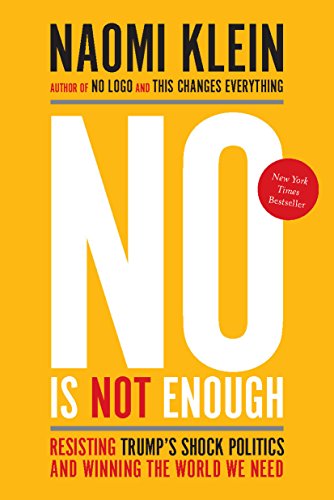No Is Not Enough: Resisting Trump’s Shock Politics and Winning the World We Need
by Naomi Klein, Alfred A. Knopf Canada, 2017
Naomi Klein’s No Is Not Enough is the logical continuation of the award-winning journalist’s No Logo (2000) and The Shock Doctrine (2007). In this well-researched and incisive book written at breakneck speed (to match the speed of Donald Trump’s sharp turns in the White House), Klein makes it very clear that Trump’s rise to power is not an aberration, but rather the inevitable culmination of neoliberal politics in recent decades. In fact, she goes on to state that the US government is not going through a transition towards corporatization, but that it has already suffered a corporate coup. She analyzes how Trump got elected as a “brand” – and an empty one at that – and how he is employing “shock tactics” to undermine the public sphere and enlarge the private one. Trump is imposing corporate hegemony, the author explains, by means of an unholy alliance between corporate interests and public office. As a case in point, she cites the example of senior appointments held by people who do not believe in the mission of the departments they head and are actually out to destroy them. Rex Tilleron, Secretary of State, former CEO of Exxon Mobil, the largest oil company in the world, and Steve Mnuchin, Treasury Secretary and former chairman in the “foreclosure machine,” are just a few examples. Klein cites other strange bedfellows, but warns her readers that by the time they read her book, the cast of characters might have changed.
Klein’s book is divided into an introduction, four expository parts, a conclusion and a postscript.
Part I explains how Donald Trump won the elections by presenting himself to an uneducated public as a brand with wide visibility. Here the author partly excoriates the press for having aided and abetted in the process by reporting his antics rather than discussing policy issues. This brand extends to his whole family including Ivanka, “whose products have notoriously been hawked by tax-payer funded public employees, including her father via Twitter, and his adviser Kellyanne Conway.” In “The Mar-a-Lago Hunger Games” chapter, Klein denounces the collusion of the press by treating Trump’s hosting of foreign leaders as “a reality show” or “infotainment.”
Part II touches upon a miscellany of subjects such as Trump’s denial of climate change and his collusion with polluting industries, his disrespect of women and the unholy alliance between Trump and US union leaders who publicly declared their allegiance to Donald Trump after he took them on a personal tour of the White House. Klein explains how economic populism was able to fill a political vacuum through the politics of division and separation.
Part III is a warning that things could certainly get worse. It is here that Naomi Klein recapitulates the shock doctrine. When the people don’t understand where a crisis is coming from and have no time to react, they turn to strong leaders. Klein explains: “shock-drunk leaders and their funders usually try to follow Machiavelli’s advice in The Prince: ‘For injuries ought to be done all at one time, so that, being tasted less, they offend less.’” Some examples cited by the author are wars, economic crises, terrorist attacks and incidents of xenophobia. In the case of New Orleans, it was a natural disaster that allowed corrupt government officials and contractors to disperse and take over the land of a vulnerable population that was allowed to die.
Part IV is visionary and inspirational. Naomi Klein is adamant when she says that rejection has to be followed by resistance. She laments that President Obama missed his chance during the financial crisis. He could have made the banking system and the automotive industry integral components of a unified vision for reviving the economy while fighting inequality and climate change at the same time. However, Klein views this not as an act of collusion but as a failure of vision and courage.
Naomi Klein concludes on an optimistic note. She believes that through solidarity, a change of attitudes (resisting our “inner Trump”) and greater political participation, we can resist the dystopian society in which we live. However, she is short on details regarding strategies for achieving radical change.
The postscript, which contains “The Leap Manifesto, A Call for a Canada Based on Caring for the Earth and One Another” [https://leapmanifesto.org/en/the-leap-manifesto/] could well be the inspiration for a new book by Klein, perhaps titled: “Political Action for Winning the World We Need.” That would be a welcome and most holy alliance.











